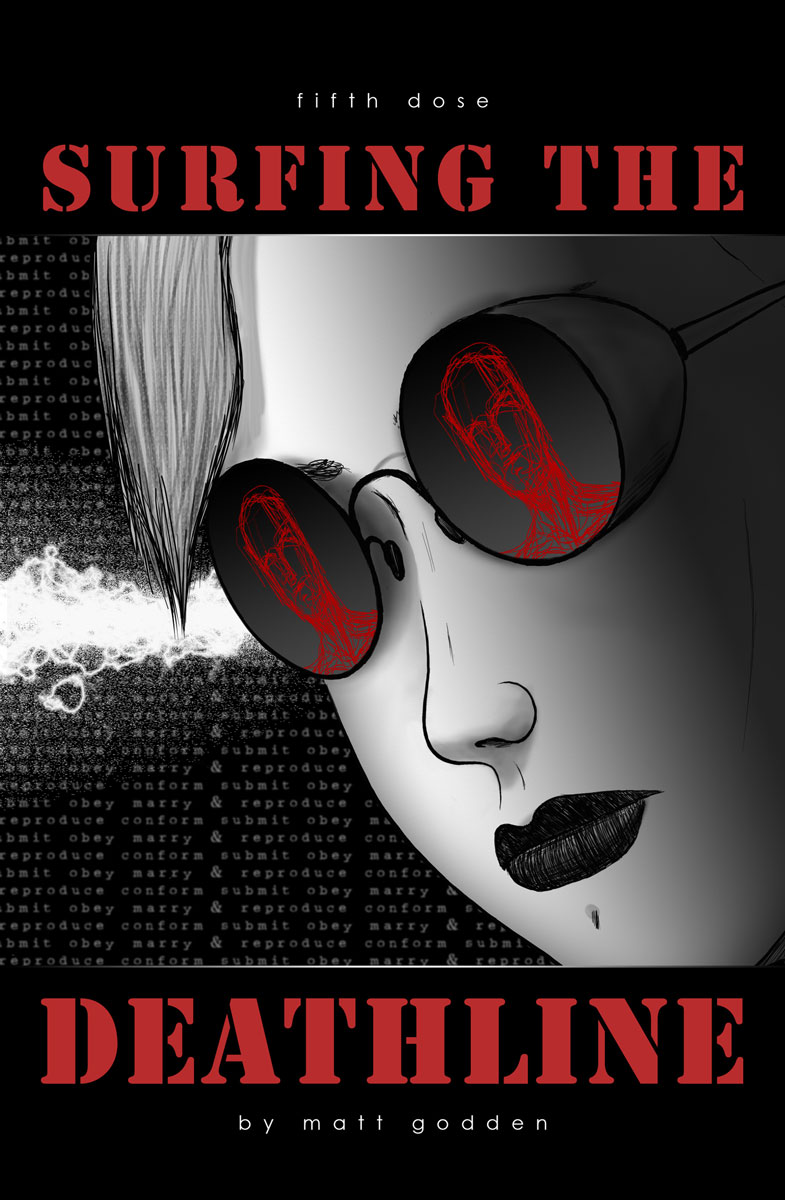Main : Timeline
Pinned and chronological feed of posts.
Surfing The Deathline – Fifth Dose
Once upon a time, in the near future, things were going well for software codemonkey & Machine Intelligence researcher Eddie Cartridge – gainfully employed, happy relationship, and a bright future ahead.
Unfortunately, he made the mistake of coming to the attention of a particularly unpleasant piece of software. Now, he’s an internationally wanted man, paralysed after a disastrous misstep with a neuro-enhancing hallucinogen known as The Deathline, and some shady characters are dragging him down a dark corridor, towards a blindingly bright room.
Meanwhile, his former partner is rediscovering her taste for the rush of The ‘Line, while introducing mortality to a great many Machine Intelligences at her employer, in pursuit of an answer to the question “Where’s Eddie?”.
This is the conclusion to Surfing The Deathline.
This book is published in DRM-Free Fixed-Layout EPUB format.
2016 in Review
Somewhat delayed, but Here’s a reflection on 2016. It’s been a relatively quiet year, mostly spent on nagging health issues. Lots of physio rebuilding my knee, which periodically gets worse, in my opinion, because the post-operative rehab physio in 2012 got me jumping too early. Just as that was coming good, I managed to tear a ligament in my dominant hand, one that keeps the tendon centred over the top of the first knuckle, meaning it fell off to the side when I bent my finger down enough. A pretty terrifying experience all round, but after 2 months in a splint it’s slowly getting better.
In terms of art, the beginning of the year saw Surfing The Deathline – Fourth Dose released, and now at the beginning of 2017, Fifth Dose is out, which means it’s all done – I could be hit by a bus tomorrow, and the work is more or less what I intended. Finishing a project that’s been going for 14 years is interesting. It didn’t really have the commercial success I would have liked, but at least it’s done. Most importantly, I’m now free to look to new projects.
Some other notable events this year were a small retrospective of student sculptures at a laneways festival, and delivering a PetchaKucha talk about The Metaning at Nambour.
Going in to 2017, what are my goals? Right now, I’m going back through the old issues of Surfing The Deathine, and updating them to the style of the last part. Then? I’ve got a bunch of photographic projects planned, some will require space to set up lights etc, some are landscape based. Along with that, there’s sculpture – I’m going to need space to weld, after which I’m going to try to learn TIG welding properly, so I can do fine and neat work. Things to look at sculpturally are revisiting the ethernet figurative piece, even if it means I just have to buy bulk cable in various shades of blue. I’ve also got to get serious about investigating bending perspex rod without blistering it, so I can build small versions of my valve sculptures.
I think that’s enough to have on my plate for the moment.
NYE 2016
Cat Cuddle Cafe
Shooting at a Brisbane cat adoption organisation. Lesson learned – use a higher minimum shutter speed for auto-iso, or use shutter priority, and trust that the indoor conditions will stop the lens up to 2.8, which is the depth of field I was using for a lot of shots.
Cats can give some pretty arresting portraits, when they’re not attempting to crash their faces into the lens.
Anachronism
The anachronism of using wood to create a case for a technological item, is perhaps blunted by the use of kevlar in the laminate. It provides scratch protection when placing the phone up or down on a flat surface, especially for the camera lens. A big plus is the minimalist logo on the back – too many cases have the casemaker’s name in huge letters.
While the packaging states it’s for the iPhone 5/5s, it’s also fine with the SE.
Noosa Classic Car Show 2016
Fundamentally Dishonest.
I recently received a communication from a representative if the Australian Copyright lobby, regarding comments I had made on Twitter at the fact that surveys of copyright association members fail to isolate territorial copyright as a question (should it exist?) on its own. This has the effect of preventing members from furnishing their representative organisation with an opinion that could clash with their stated policy, driven as it is, in my opinion, by publishers and middlemen, rather than creators. The response I started writing became so long, that it felt like the sort of thing that makes you look like a crazy person when you email it to someone – “here’s my manifesto”, so to speak.
Therefore, I’m presenting a mildly rewritten version here, where ranty manifestos belong, and sending a short version to the original intended recipient.
As a creator of copyright material, I fundamentally disagree with one of the positions for which Copyright Australia / Viscopy has been an advocate – territorial licensing.
From the outset, lest I appear some sort of Pirate Party sympathiser, I like copyright. I actually think, like shares or land, it should never expire. I think it is a fundamental problem that an artist can’t pass on to their descendants in perpetuity, the sole economic rights to their life’s work, whereas a slumlord with a portfolio of apartments, or a farmer with acres of fields, or a daytrader with a share portfolio, can. All of these require a person to invest their time, and their finances to build up to a point where they’re revenue-positive, but only one gets repossessed by the state 70 years after its creator’s death. Counter-intuitively, it’s the one which doesn’t detract from a finite pool that gets nationalised, whereas land owners can keep benefitting from their exclusive economic rights in perpetuity.
However, I think the protections of copyright carry a social contract that the copyright industry is failing to uphold, and that this failure is at the root of the problem of piracy, and the world-wide movement against copyright.
As members of various copyright organisations, we’re asked for opinions via surveys, which are used by the organisations to lobby government and direct public policy.
The only questions addressing regional licensing in recent surveys, have bundled it with other issues, so that it was impossible for members to express an opinion against regional licensing, without also coming out against something else, which I recall as not being against.
I find this troubling, as it suggests those creating the surveys are either so out of touch / embedded in an echo chamber, that they can’t see the sentiment outside their windows, or that it reflects a, frankly disingenuous, attempt to direct the “results” towards a predetermined outcome.
I suspect that if CA were to survey creators, rather than middlemen or publishers, on this issue in isolation (obviously, with a case that was fairly stated, for both perspectives), it would find most in favour of protecting consumer’s rights to participate in the global economy, and against geographical licensing.
I also suspect it would be hard to find anyone who wasn’t a current, or former, employee of Foxtel, who thinks it’s reasonable for them to have to subscribe to that service, for one tv show which can be bought on its own outside Australia. Or indeed, to watch the full Formula 1 racing season, which anti-siphoning rules have failed to keep on free-to-air TV. Ask Netflix’s Australian customers how they feel about not having access to the same library, at the same price, that American consumers have. Ask yourself why Choice magazine is recommending everyone use VPNs to get around geoblocking.
The Australian people understand, that if their jobs are now subject to global competition, able to be shifted to places where labour is cheaper, then it is only reasonable that they have the same ability to offshore their consumption to markets where products are cheaper.
I would put it to the reader, that the disrespect for this basic right, and the willingness to take advantage of Globalisation (eg to manufacture DVDs cheaply overseas) when it suits, while working to deny those rights to our customers, robs us of the moral high ground to present the case that actually matters – if you access content that its creator put a price on, you must pay that price to access that content.
Arguments about how many jobs are created as a result of regional licensing lose their moral weight when those jobs depend on market manipulation, interfering with free global trade, and rent-seeking behaviour, none of which, consumers should, or indeed do, feel any obligation to protect, especially when it’s not their choice to do so.
By illustration, here’s the archetypical example – I want to buy Dan Koeppel’s book, “Banana” – a geopolitical history of banana cultivation world wide. I want to read it on my iPad, since I don’t have space to keep any more paper books. It’s available for sale on the American iBooks store, It’s available for sale on the American Kindle store, I even follow, and am followed by Dan on Twitter, and have had conversations with him about problems getting Banana.
Penguin (Australia) hold the territorial rights to both print and eBook versions. They have not bothered to make an eBook version available to Australian consumers, and territorial licensing means I can’t buy it from the American stores. They won’t spend the money and time to make it available, but they won’t let us get it anywhere else, either.
Why should the law, copyright advocates, or the Australian people, support this behaviour?























































































































































































